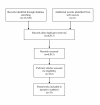Disseminating research findings: what should researchers do? A systematic scoping review of conceptual frameworks
- PMID: 21092164
- PMCID: PMC2994786
- DOI: 10.1186/1748-5908-5-91
Disseminating research findings: what should researchers do? A systematic scoping review of conceptual frameworks
Abstract
Background: Addressing deficiencies in the dissemination and transfer of research-based knowledge into routine clinical practice is high on the policy agenda both in the UK and internationally.However, there is lack of clarity between funding agencies as to what represents dissemination. Moreover, the expectations and guidance provided to researchers vary from one agency to another. Against this background, we performed a systematic scoping to identify and describe any conceptual/organising frameworks that could be used by researchers to guide their dissemination activity.
Methods: We searched twelve electronic databases (including MEDLINE, EMBASE, CINAHL, and PsycINFO), the reference lists of included studies and of individual funding agency websites to identify potential studies for inclusion. To be included, papers had to present an explicit framework or plan either designed for use by researchers or that could be used to guide dissemination activity. Papers which mentioned dissemination (but did not provide any detail) in the context of a wider knowledge translation framework, were excluded. References were screened independently by at least two reviewers; disagreements were resolved by discussion. For each included paper, the source, the date of publication, a description of the main elements of the framework, and whether there was any implicit/explicit reference to theory were extracted. A narrative synthesis was undertaken.
Results: Thirty-three frameworks met our inclusion criteria, 20 of which were designed to be used by researchers to guide their dissemination activities. Twenty-eight included frameworks were underpinned at least in part by one or more of three different theoretical approaches, namely persuasive communication, diffusion of innovations theory, and social marketing.
Conclusions: There are currently a number of theoretically-informed frameworks available to researchers that can be used to help guide their dissemination planning and activity. Given the current emphasis on enhancing the uptake of knowledge about the effects of interventions into routine practice, funders could consider encouraging researchers to adopt a theoretically-informed approach to their research dissemination.
Figures
References
-
- Cooksey D. A review of UK health research funding. London: Stationery Office. 2006.
-
- Darzi A. High quality care for all: NHS next stage review final report. London: Department of Health; 2008. - PubMed
-
- Department of Health. Best Research for Best Health: A new national health research strategy. London: Department of Health; 2006. - PubMed
-
- National Institute for Health Research. Delivering Health Research. National Institute for Health Research Progress Report 2008/09. London: Department of Health. 2009.
-
- Tooke JC. Report of the High Level Group on Clinical Effectiveness A report to Sir Liam Donaldson Chief Medical Officer. London: Department of Health. 2007.
Publication types
Grants and funding
LinkOut - more resources
Full Text Sources
Medical
Miscellaneous


